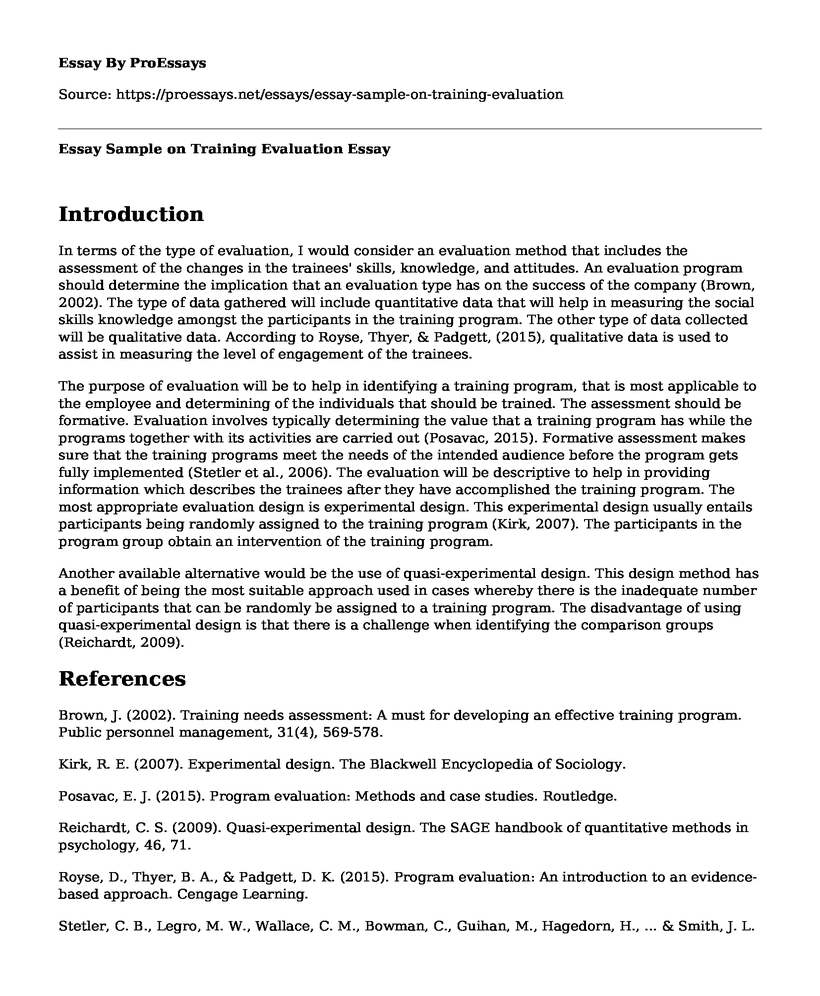Introduction
In terms of the type of evaluation, I would consider an evaluation method that includes the assessment of the changes in the trainees' skills, knowledge, and attitudes. An evaluation program should determine the implication that an evaluation type has on the success of the company (Brown, 2002). The type of data gathered will include quantitative data that will help in measuring the social skills knowledge amongst the participants in the training program. The other type of data collected will be qualitative data. According to Royse, Thyer, & Padgett, (2015), qualitative data is used to assist in measuring the level of engagement of the trainees.
The purpose of evaluation will be to help in identifying a training program, that is most applicable to the employee and determining of the individuals that should be trained. The assessment should be formative. Evaluation involves typically determining the value that a training program has while the programs together with its activities are carried out (Posavac, 2015). Formative assessment makes sure that the training programs meet the needs of the intended audience before the program gets fully implemented (Stetler et al., 2006). The evaluation will be descriptive to help in providing information which describes the trainees after they have accomplished the training program. The most appropriate evaluation design is experimental design. This experimental design usually entails participants being randomly assigned to the training program (Kirk, 2007). The participants in the program group obtain an intervention of the training program.
Another available alternative would be the use of quasi-experimental design. This design method has a benefit of being the most suitable approach used in cases whereby there is the inadequate number of participants that can be randomly be assigned to a training program. The disadvantage of using quasi-experimental design is that there is a challenge when identifying the comparison groups (Reichardt, 2009).
References
Brown, J. (2002). Training needs assessment: A must for developing an effective training program. Public personnel management, 31(4), 569-578.
Kirk, R. E. (2007). Experimental design. The Blackwell Encyclopedia of Sociology.
Posavac, E. J. (2015). Program evaluation: Methods and case studies. Routledge.
Reichardt, C. S. (2009). Quasi-experimental design. The SAGE handbook of quantitative methods in psychology, 46, 71.
Royse, D., Thyer, B. A., & Padgett, D. K. (2015). Program evaluation: An introduction to an evidence-based approach. Cengage Learning.
Stetler, C. B., Legro, M. W., Wallace, C. M., Bowman, C., Guihan, M., Hagedorn, H., ... & Smith, J. L. (2006). The role of formative evaluation in implementation research and the QUERI experience. Journal of General Internal Medicine, 21(2), S1.
Cite this page
Essay Sample on Training Evaluation. (2022, Oct 13). Retrieved from https://proessays.net/essays/essay-sample-on-training-evaluation
If you are the original author of this essay and no longer wish to have it published on the ProEssays website, please click below to request its removal:
- How Sports Affect Children - Research Paper
- Children's Literature Titled Charlotte's Web and The Tale of Despereaux
- Controversy Surrounding the Paying of College Athletes
- Why College Is for Everyone Essay Example
- Essay Sample on Kids: Active Agents in Society's Structures & Change
- Exploring Childhood Identity: Interviews With Two Children and Their Mothers - Essay Sample
- Infant Brain Dev: Extrinsic & Intrinsic Factors Impact Learn & Growth - Essay Sample







